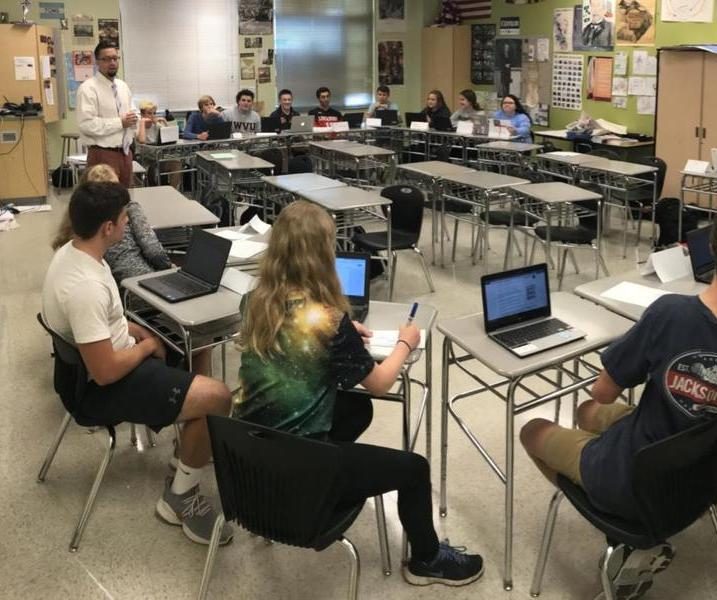What’s up with freshmen taking AP US History?
Juniors participate in a debate in an AP US History class.
October 23, 2018
As an avid reader, writer, and history enthusiast, I’ve often chosen to enroll in AP history classes. The time I spent in AP World History during my sophomore year gave me the experience that I felt adequately prepared me for a semester-long course of AP US History in my junior year. However, this year, the course order has changed.
Instead of taking American Studies in their junior year, current and future freshmen will be taking American Studies as their ninth grade history course. This means, of course, that some students will be offered the chance to take AP US History (APUSH).
Initially, I was skeptical that freshmen would be taking an AP history class. After all, I had just spent a year being highly challenged as a sophomore. It seemed strange to me that students so new to high school would be put into such a challenging class. However, this has been taken into account, and our teachers are attempting to make this class more suitable for freshmen by requiring year-long enrollment and making very small classes.
Originally, the course order for social studies following American Studies 1 in eighth grade was: Government (9), Modern/AP World (10), and AP/American Studies 2 (11). This year, however, that order in all FCPS schools is changed. From now on, the order in which students take social studies courses will be: AP/American Studies 2 (9), Government (10), and Modern/AP World (11).
This is a change that came to a surprise to students.
“It was weird news to receive,” said Elizabeth Gilmore, a junior enrolled in APUSH this semester. “This is a class that used to be for juniors, so it’s a new thing to get used to. It’s weird to think that freshmen used to take Government, but now have the option to take an upper level history class made for juniors.”
After all, the entire point of taking AP World in the sophomore year was so students could get used to how an AP class functions. By having students take APUSH first, it feels like that benefit is being completely erased.
Mr. Aaron Burch, who teaches APUSH to freshmen this year, said, “For freshmen, it must be the year-long option in order to develop the intricate skills in order to be successful in this course and on the exam. A student needs the material and conceptual skills to be spread out.”
By making the class a year long for freshmen, teachers are making sure that they will be taught the skills that used to be taught to sophomores in AP World. After making the class suitable for freshmen students, our teachers will be able to focus on teaching material that students are already familiar with.
“There is a logical pairing of AS1 and AS2, having them consecutively as a history class in grades eight and nine respectfully,” said Burch.
This order makes much more sense. Since students take their first half of American Studies in eighth grade, it seems more straightforward to me to have them take the second half the year after. The two year gap that was present in the old course order gave students more time to forget what they had learned in American Studies 1. With this change in the order, however, that problem has been eliminated.
“It’s a lot easier than I thought it would be,” said Emily Lotito, a freshman currently enrolled in American Studies 1. “Since we learned a lot of this last year, it’s easy to understand.”
Additionally, moving Government into the sophomore year gives students a better opportunity to understand the material. By their sophomore year, students will have gone over all available US history, and will be able to more easily understand American politics. Similarly, students will be older and more aware of current evens relating to government.
“Government will benefit students in tenth grade much more,” said Burch. “Students’ vocabularies grow exponentially from one year to the next, so moving Government back a grade makes passing the HSA even more of a likelihood.”
It’s clear that the change in the social studies course order is one for the students.
“We are hoping the logical order allows students to be more successful,” said Burch. “And that a more natural flow does not too adversely affect Social Studies’ already healthy environment.”



